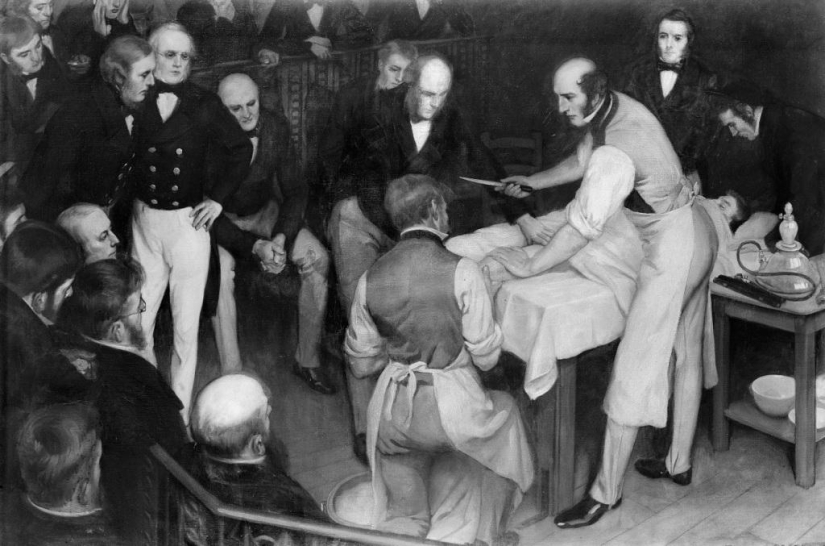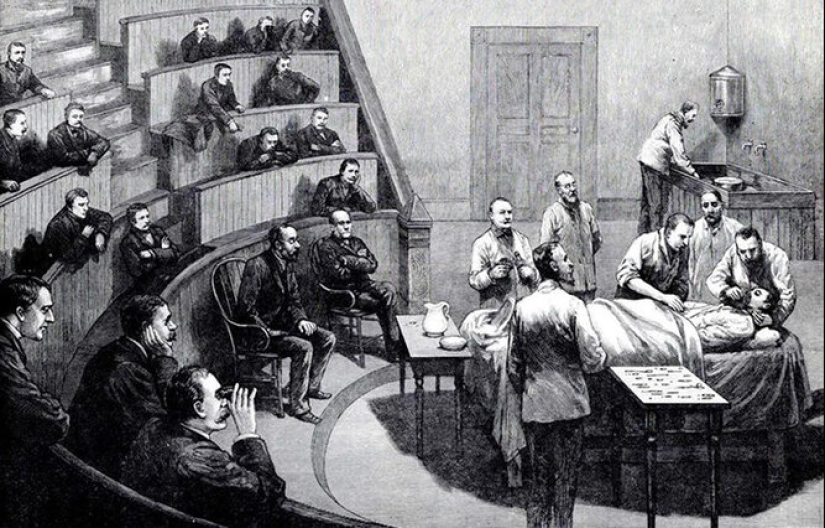How the English doctor Robert Liston killed three people in one operation
Categories: Health and Medicine
By Pictolic https://pictolic.com/article/how-the-english-doctor-robert-liston-killed-three-people-in-one-operation.htmlEveryone knows that even with the modern level of medicine, no one undertakes to guarantee the life of a patient during operations. What can we say about the 19th century, when many surgeons relied more on luck rather than skill and knowledge. But even for those times, the operation of Dr. Robert Liston (Robert Liston) with a mortality rate of 300% was too unsuccessful. It is difficult to argue with this, since not only the patient died then, but also two other people present in the operating room.

Robert Liston (1794-1847) began his medical career at the Royal Infirmary of Edinburgh. In Scotland, the doctor became famous for his innovative approach to medicine and quarrelsome disposition. In 1818, Liston decided that he was worthy of more and moved to London to make a brilliant medical career.

The doctor immediately attracted attention by the speed with which he performed operations. It was said that no one amputates limbs as fast as Liston. For his skill, the doctor was nicknamed "The fastest knife in the West End" and became one of the most sought-after surgeons in London.
Only one of Robert Liston's 10 patients died. It seems that this is a terrible statistic, but it is worth clarifying that one in four other surgeons died. Liston's success was precisely in his speed. In the 19th century there was no anesthesia and the idea of sterility was very approximate. Therefore, the faster the operation was performed, the more chances the patient had to survive.
They wrote that the "Fastest knife of the West End" amputated his leg in just three minutes. There is also information that once the surgeon managed in just 28 seconds! For amputations, not a scalpel was used, but a special long knife and the surgeon cut through the skin with muscles with one or two confident circular movements. Immediately, the assistant sawed the bone with a special saw and the edges of the wound were quickly sewn together.

Sometimes the need to act as quickly as possible led to sad curiosities. Surgeons often cut off their own or their assistants' fingers. One day, a doctor was in such a hurry that he took off the patient's testicles along with his leg. But all this was a trifle compared to Liston's historic operation with 3 dead.
During that operation, Robert Liston made an incision on the patient's thigh so confidently and quickly that he cut off his assistant's finger. At the same time, the surgeon also touched the coat of one of the spectators, an elderly man, with his razor–sharp instrument. He decided that the knife had pierced him and turned out to be so impressionable that he immediately died of a heart attack.

Liston's patient and his assistant died one after the other a few days later from blood poisoning. Thus, the mortality rate during the operation reached 300 percent. Now it is difficult to say whether there was actually a famous operation or it was just a medical story. Or maybe it's all about the rumors started by envious colleagues in the shop?
At that time, Dr. Robert Liston was a luminary whose fame kept many awake. He knew that the sooner he completed his task, the less the patient would suffer, lose less blood and his wound would be less at risk of infection. In 1846, he performed the first operation in Europe with general anesthesia with ether. The doctor successfully amputated the leg of the patient James Churchill.

Contemporaries described Liston as an experienced doctor, but also saw him as a poseur and showman. Tall, 188 cm tall, and broad-shouldered, the doctor went out for surgery in a special suit. It consisted of a long green coat, an oilcloth apron and rubber boots. First of all, the surgeon greeted those present - assistants and spectators, without whom a rare operation was performed at that time. Then Liston loudly proclaimed "It's time, gentlemen!" and immediately grabbed a knife.
Each time the doctor tried to beat his previous speed record. During the surgery, Liston forgot about everything in the world except his patient. Sometimes he clamped his teeth on the bloody knife with which he had just cut the flesh to free his hands. The surgeon had dozens of lives saved on his account. Liston often took on patients who were rejected by other doctors and saved them.

In his spare time from surgery, Liston was engaged in science. The doctor was far ahead of his time and offered developments that amazed his contemporaries. He invented orthopedic shoes to combat clubfoot and the "Liston tire", which was used in military field surgery. So whether that operation actually took place or not doesn't really matter. The doctor has done enough to make it possible to talk about him as one of the medical geniuses of the 19th century. And geniuses, as you know, are also people and have the right to make mistakes.
Recent articles

It's high time to admit that this whole hipster idea has gone too far. The concept has become so popular that even restaurants have ...

There is a perception that people only use 10% of their brain potential. But the heroes of our review, apparently, found a way to ...

New Year's is a time to surprise and delight loved ones not only with gifts but also with a unique presentation of the holiday ...